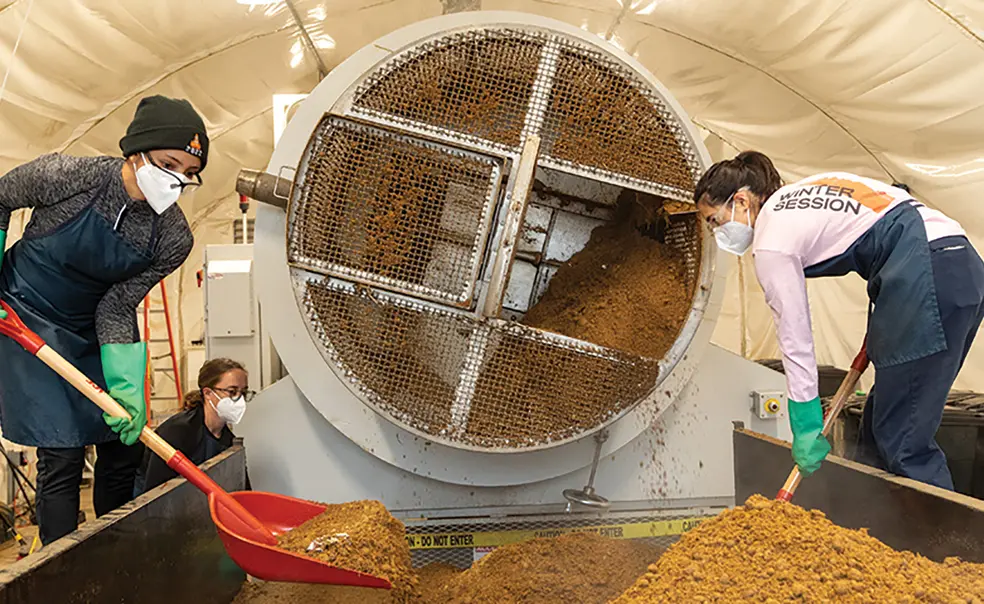Princeton’s S.C.R.A.P. Lab Turns Food Waste into Compost
The lab processed 43 tons of food waste in 2023, providing compost for campus grounds
The more you work at the S.C.R.A.P. Lab, the more you get used to the composting facility’s rather pungent smell, according to Emery Jones-Flores ’26. Once or twice a week, before her classes begin for the day, Jones-Flores heads down Washington Road to the other side of Lake Carnegie to weigh and process food waste at the lab, which is named for “Sustainable Composting Research at Princeton.”
“Being in the academic bubble of Princeton made me want to do something … more hands-on,” said Jones-Flores. “I would say it’s kind of therapeutic.”
Jones-Flores is one of nine students who are working with Gina Talt ’15, food systems project manager at Princeton and de facto leader of the lab, processing raw scraps and uneaten cooked food from Frist Campus Center and campus cafés this semester. Scrappy, Talt’s nickname for the lab, shreds, aerates, and mixes the material, which is used on campus grounds once it reaches maturity and helps to reduce the use of pesticides.
In 2023, Talt said Scrappy processed 43 tons of food waste, and in 2019 — the lab’s most consistent, full-year operation — 62 tons were processed.
Though Scrappy opened in 2018 as a three-year pilot project, that timeframe was lengthened due to the pandemic and the relocation of the facility.
“We’re trying to work with building services to gradually expand this program and what that would look like if we put more staff and resourcing” into the lab as it transitions out of the pilot phase this summer, according to Talt.
In addition to producing compost, the S.C.R.A.P. Lab acts as, well, a lab. The pandemic disrupted one experiment with Daniel Rubenstein, professor of zoology, emeritus, that sought to examine the role of compost in remediating and increasing soil fertility.
Currently, Talt — who earned her bachelor’s degree in economics and a certificate in environmental studies before returning to Princeton for a post-baccalaureate fellowship with the Office of Sustainability, eventually leading to her current position — is expanding collection locations, starting with spent coffee grounds from the student-run Coffee Club.
She is also working with Xinning Zhang, an assistant professor of geosciences and at the High Meadows Environmental Institute, whose lab focuses on natural and human-influenced microbial processes, on a grant from New Jersey’s Department of Environmental Protection to study how dining-sourced bioplastics and fiberware — compostable silverware, plates, and cups — affect Scrappy’s compost quality.
Zhang and the intrepid students in her freshman seminar course analyzed data collected during the fall semester that suggests the addition of compostable servicewear increases the amount of nitrate in the compost and also makes it less stable and mature, meaning the compost is still in the process of breaking down. Zhang will run the class again this fall to collect more data and hopefully come up with “a solid answer to this question of what’s the effect of compostables” on composting quality.
Zhang said Scrappy is “a nice mechanism to do research,” and empowers students who are passionate about environmental sustainability to be “able to go learn the science, but also help answer a question, an important question, for sustainability, and learn all these lab methods.”
One of Talt’s biggest sustainability goals doesn’t involve Scrappy at all; she says Princeton’s initiatives need to “integrate education” because about 10% of the waste disposed in compostable bins by Frist diners is contaminated with noncompostable items like glass bottles. “It really slows things down. And I think being more conscious about the effort also ties it back to the why” behind composting, Talt said.
“For us, it’s not just that quantitative benefit of number of pounds of material [diverted] from landfill, but we see the value of the connection to the core mission of the University,” said Talt.
Jones-Flores also sees the bigger picture: “Learning how to compost and learning how to maintain a healthy and sustainable environment — we don’t necessarily have a choice. That’s something we have to work towards.”










1 Response
Max Maizels ’72
1 Year AgoBenefits and Costs of Composting Operation
Nowhere in your article “Let’s Talk Trash” (March issue) is there mention of the cost or economic impact of the Sustainable Composting Research at Princeton Lab. Without cost figures or how the program is funded, it is not possible to determine whether the program is beneficial, efficient, or makes sense economically.
I assume that little attention is paid to citing the cost or source of funding because the money either comes from a grant or the taxpayer, so it is someone else’s money?
Editor’s note: According to the S.C.R.A.P. Lab, the composting equipment was purchased with a donor grant and ongoing funding comes from multiple sources, including support from the facilities department and grants for specific research projects. For additional information, visit scraplab.princeton.edu/about.